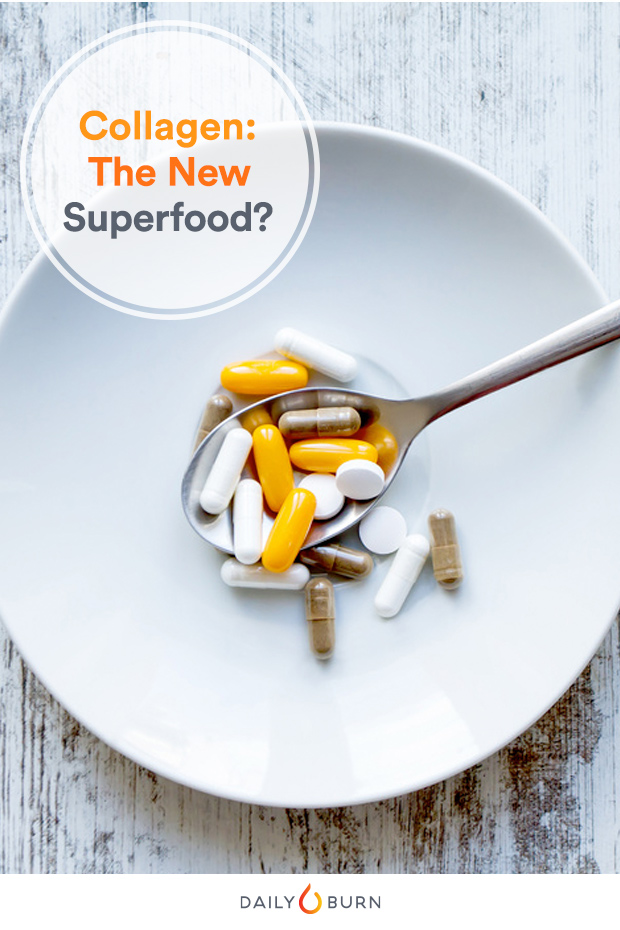
Move over butter, there’s a new way to boost your coffee: a spoonful of collagen. You’ve probably heard of collagen in beauty terms — it’s what makes your skin springy and wrinkle-free. But die-hards say it does way more than that.
The Health Benefits of…Collagen?
First, know that collagen is found in the connective tissue — skin, tendons, ligaments and bones — of animals. (So vegans, take heed.) The gelatinous substance is also rich in essential amino acids, making it a complete protein.
Collagen’s muscle-building benefits aren’t the only things health nuts are after, though. People are mixing collagen into java, smoothies, oatmeal and water to repair muscles post-workout, strengthen skin, hair and nails, and improve digestion. So the obvious question: Does it live up to the hype?
RELATED: 11 Healthy Homemade Protein Bar Recipes
For Your Workout
You’ve probably heard that you should eat carbs to replenish glycogen stores as well as protein to rebuild muscles after a workout. Because collagen is a protein, it makes sense to add it to your post-exercise routine, says Rebecca Mohning, RD, a sports dietitian and owner of Expert Nutrition. That said, eating collagen isn’t any better than, say, digging into a couple of hardboiled eggs or a turkey sammie, she says.
One plus, though, is that it has a leg up on plant-based proteins, like beans or nuts. “Because collagen is an animal-based product and therefore contains all the essential amino acids for muscle repair, it has an advantage over plant-based proteins. Plants miss some of these amino acids, so you have to eat a mixture of them to get what you need,” says Mohning. Collagen can therefore be an easy way to jumpstart recovery if you don’t want to eat meat, fish, eggs, or dairy following a workout.
RELATED: What 25 Grams of Protein Looks Like
Another consideration: Athletes are starting to take in protein before exercise, says Mohning. The theory is, she says, that the proteins will be available for muscle building while working out. Fair warning: Protein takes longer to digest, so your GI system might not react well when you’re in the gym. That’s why experts tend to tell their athletes to save the protein for post-exercise. However, if you’d like to experiment, drinking collagen will certainly be easier for your body to break down while hoofing it on the treadmill than, say, nibbling on beef jerky pre-gym.
Either way, Mohning recommends eating 15 grams of protein ASAP after a workout (strength or cardio) to jumpstart the repair process. If that’s from collagen, read the label. For one popular brand, you’d have to stir in 2.5 tablespoons of the stuff.
RELATED: Is Cricket Flour the New Protein Powder?

For Your Health
When reading up on the latest greatest superfood, believers will attest it can do anything. And collagen is no exception. For one, it’s highly touted as a beauty supplement to improve the strength and smoothness of hair, skin and nails. In one study in the Journal of Cosmetic Dermatology, a collagen supplement was shown to improve skin hydration and boost collagen production within skin after 12 weeks. Simply put, more collagen production equals fewer wrinkles.
Another, published in the Journal of Medicinal Food, found that six months of collagen popping smoothed out the appearance of cellulite in normal weight women. (Before you go all in, temper your expectations. This was a study done by a collagen supplement company.)
RELATED: 7 Superfood Lattes That Will Make You Quit Coffee
“It may also help keep up the integrity of your bones,” says Robyn Coale, RD, owner of Nutshell Nutrition. Meaning, it may preserve bone and joint health. It’s also been credited with healing what’s called “leaky gut,” a process where cells that line your digestive tract begin to break apart, allowing inflammatory molecules to leak into your bloodstream and cause inflammation. Collagen may be able to help plug those holes, says Coale.
That sounds great, of course, but Coale cautions against relying too much on any supplement. “I’d recommend it after your body has gone through a stressful period, like a broken bone, surgery, or a current sickness,” she says. While it’s not going to, say, repair a break like a cast, it can act as a supporting player and “give the body a boost so it doesn’t have to work as hard on its own,” she says.
RELATED: 6 Ways to Naturally Boost Your Metabolism
The Bottom Line
“Nothing can replace good nutrition. You can’t pack a poor diet with crappy food and think collagen will solve your problems,” says Coale. So add collagen to your coffee if you’d like or into your post-workout snack rotation (look for grass-fed versions), but focus on food first. Eating ample healthy fats (avocado, nuts, olive oil) will benefit your skin, hair and nails. Getting enough calories (rather than chronically dieting or overexercising) is also key to bone health. And a whole foods-based diet — one that’s not stressing the body with dieting (yep, again) — will keep your gut happy and healthy, she adds.
Originally published August 2016. Updated February 2017.
